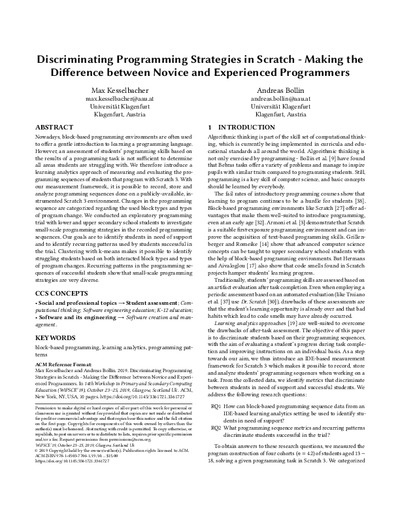Discriminating Programming Strategies in ScratchMaking the Difference between Novice and Experienced Programmers
Max Kesselbacher, Andreas Bollin
Publikationsdatum:
|
 |
 Diese Seite wurde seit 2 Jahren inhaltlich nicht mehr aktualisiert.
Unter Umständen ist sie nicht mehr aktuell.
Diese Seite wurde seit 2 Jahren inhaltlich nicht mehr aktualisiert.
Unter Umständen ist sie nicht mehr aktuell.
 Zusammenfassungen
Zusammenfassungen

Nowadays, block-based programming environments are often used to offer a gentle introduction to learning a programming language. However, an assessment of students' programming skills based on the results of a programming task is not sufficient to determine all areas students are struggling with. We therefore introduce a learning analytics approach of measuring and evaluating the programming sequences of students that program with Scratch 3. With our measurement framework, it is possible to record, store and analyze programming sequences done on a publicly-available, instrumented Scratch 3 environment. Changes in the programming sequence are categorized regarding the used block types and types of program change. We conducted an exploratory programming trial with lower and upper secondary school students to investigate small-scale programming strategies in the recorded programming sequences. Our goals are to identify students in need of support and to identify recurring patterns used by students successful in the trial. Clustering with k-means makes it possible to identify struggling students based on both interacted block types and types of program changes. Recurring patterns in the programming sequences of successful students show that small-scale programming strategies are very diverse.
 Dieses Konferenz-Paper erwähnt ...
Dieses Konferenz-Paper erwähnt ...
 Personen KB IB clear | Efthimia Aivaloglou , Lorin W. Anderson , Michal Armoni , Mordechai Ben-Ari , B. S. Bloom , Bryce Boe , Andreas Bollin , Sande Chen , Phillip Conrad , Heike Demarle-Meusel , Greg Dreschler , Diana Franklin , Andreas Grillenberger , Erik Harpstead , Felienne Hermans , Charlotte Hill , Max Kesselbacher , Kenneth R. Koedinger , David R. Krathwohl , Michelle Len , Raymond Lister , Orni Meerbaum-Salant , David Michael , Corinna Mößlacher , Seymour Papert , Viera K. Proulx , Kelly Rivers , Marianne Rohrer , Ralf Romeike , Julia Sylle , John Broadus Watson | ||||||||||||||||||||||||||||||||||||||||||||||||||||||||||||||||||||||||||||||||||||||||||||||||||||||||||||||||||||||||||||||
 Begriffe KB IB clear | Bottom-upbottom up
, code smells
, computational thinkingcomputational thinking
, Dr. Scratch
, Fehlvorstellungen / misconceptions
, Informatikcomputer science
, Informatik-Biber
,  learning analytics learning analytics learning analytics
, learning analytics
,  Programmieren Programmieren programming
, Programmiersprachenprogramming languages
, programming
, Programmiersprachenprogramming languages
,  Scratch
, Software EngineeringSoftware Engineering Scratch
, Software EngineeringSoftware Engineering
| ||||||||||||||||||||||||||||||||||||||||||||||||||||||||||||||||||||||||||||||||||||||||||||||||||||||||||||||||||||||||||||||
 Bücher |
| ||||||||||||||||||||||||||||||||||||||||||||||||||||||||||||||||||||||||||||||||||||||||||||||||||||||||||||||||||||||||||||||
 Texte |
|
 Dieses Konferenz-Paper erwähnt vermutlich nicht ...
Dieses Konferenz-Paper erwähnt vermutlich nicht ... 
 Nicht erwähnte Begriffe | blockbasierte Programmierumgebungen, Fehlvorstellungen beim Programmieren, Informatik-Didaktik, Informatik-Unterricht (Fachinformatik), Top-down |
 Tagcloud
Tagcloud
 Zitationsgraph
Zitationsgraph
 Zitationsgraph (Beta-Test mit vis.js)
Zitationsgraph (Beta-Test mit vis.js)
 Zeitleiste
Zeitleiste
 2 Erwähnungen
2 Erwähnungen 
- WiPSCE '20 - Workshop in Primary and Secondary Computing Education, Virtual Event, Germany, October 28-30, 2020 (Torsten Brinda, Michal Armoni) (2020)
- Block-based learning analytics repository and dashboard - towards an interface between researcher and educator (Max Kesselbacher, Kevin Wiltschnig, Andreas Bollin) (2020)


- Block-based learning analytics repository and dashboard - towards an interface between researcher and educator (Max Kesselbacher, Kevin Wiltschnig, Andreas Bollin) (2020)
- WIPSCE '23 - The 18th WiPSCE Conference on Primary and Secondary Computing Education Research (Sue Sentance, Mareen Grillenberger) (2023)
- Impact of Hint Content on Performance and Learning - A Study with Primary School Children in a Scratch Course (Luisa Greifenstein, Markus Brune, Tobias Fuchs, Ute Heuer, Gordon Fraser 0001) (2023)


- Impact of Hint Content on Performance and Learning - A Study with Primary School Children in a Scratch Course (Luisa Greifenstein, Markus Brune, Tobias Fuchs, Ute Heuer, Gordon Fraser 0001) (2023)
 Anderswo finden
Anderswo finden
 Volltext dieses Dokuments
Volltext dieses Dokuments
 |  Discriminating Programming Strategies in Scratch: Artikel als Volltext ( Discriminating Programming Strategies in Scratch: Artikel als Volltext ( : :  , 393 kByte; , 393 kByte;  : :  ) ) |
 Anderswo suchen
Anderswo suchen 
 Beat und dieses Konferenz-Paper
Beat und dieses Konferenz-Paper
Beat hat Dieses Konferenz-Paper während seiner Zeit am Institut für Medien und Schule (IMS) ins Biblionetz aufgenommen. Beat besitzt kein physisches, aber ein digitales Exemplar. Eine digitale Version ist auf dem Internet verfügbar (s.o.). Es gibt bisher nur wenige Objekte im Biblionetz, die dieses Werk zitieren.























 Biblionetz-History
Biblionetz-History